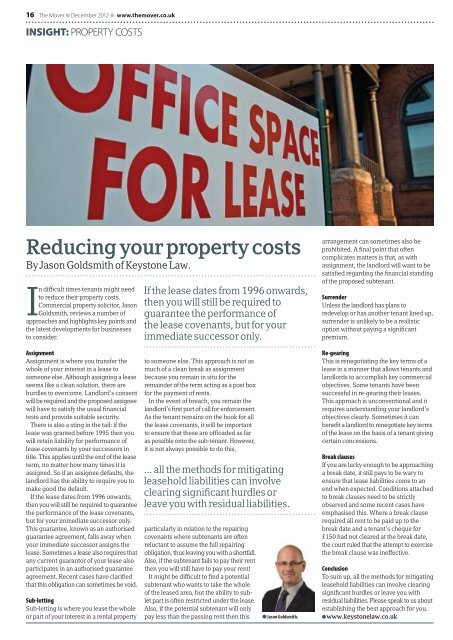The Mover December 2012
The Mover December 2012
The Mover December 2012
Create successful ePaper yourself
Turn your PDF publications into a flip-book with our unique Google optimized e-Paper software.
16 <strong>The</strong> <strong>Mover</strong> ● <strong>December</strong> <strong>2012</strong> ● www.themover.co.ukINSIGHT: PROPERTY COSTSReducing your property costsBy Jason Goldsmith of Keystone Law.In difficult times tenants might needto reduce their property costs.Commercial property solicitor, JasonGoldsmith, reviews a number ofapproaches and highlights key points andthe latest developments for businessesto consider.If the lease dates from 1996 onwards,then you will still be required toguarantee the performance ofthe lease covenants, but for yourimmediate successor only.arrangement can sometimes also beprohibited. A final point that oftencomplicates matters is that, as withassignment, the landlord will want to besatisfied regarding the financial standingof the proposed subtenant.SurrenderUnless the landlord has plans toredevelop or has another tenant lined up,surrender is unlikely to be a realisticoption without paying a significantpremium.AssignmentAssignment is where you transfer thewhole of your interest in a lease tosomeone else. Although assigning a leaseseems like a clean solution, there arehurdles to overcome. Landlord’s consentwill be required and the proposed assigneewill have to satisfy the usual financialtests and provide suitable security.<strong>The</strong>re is also a sting in the tail: if thelease was granted before 1995 then youwill retain liability for performance oflease covenants by your successors intitle. This applies until the end of the leaseterm, no matter how many times it isassigned. So if an assignee defaults, thelandlord has the ability to require you tomake good the default.If the lease dates from 1996 onwards,then you will still be required to guaranteethe performance of the lease covenants,but for your immediate successor only.This guarantee, known as an authorisedguarantee agreement, falls away whenyour immediate successor assigns thelease. Sometimes a lease also requires thatany current guarantor of your lease alsoparticipates in an authorised guaranteeagreement. Recent cases have clarifiedthat this obligation can sometimes be void.Sub-lettingSub-letting is where you lease the wholeor part of your interest in a rental propertyto someone else. This approach is not asmuch of a clean break as assignmentbecause you remain in situ for theremainder of the term acting as a post boxfor the payment of rents.In the event of breach, you remain thelandlord’s first port of call for enforcement.As the tenant remains on the hook for allthe lease covenants, it will be importantto ensure that these are offloaded as faras possible onto the sub-tenant. However,it is not always possible to do this,... all the methods for mitigatingleasehold liabilities can involveclearing significant hurdles orleave you with residual liabilities.particularly in relation to the repairingcovenants where subtenants are oftenreluctant to assume the full repairingobligation, thus leaving you with a shortfall.Also, if the subtenant fails to pay their rentthen you will still have to pay your rent!It might be difficult to find a potentialsubtenant who wants to take the wholeof the leased area, but the ability to subletpart is often restricted under the lease.Also, if the potential subtenant will onlypay less than the passing rent then this● Jason Goldsmith.Re-gearingThis is renegotiating the key terms of alease in a manner that allows tenants andlandlords to accomplish key commercialobjectives. Some tenants have beensuccessful in re-gearing their leases.This approach is unconventional and itrequires understanding your landlord’sobjectives clearly. Sometimes it canbenefit a landlord to renegotiate key termsof the lease on the basis of a tenant givingcertain concessions.Break clausesIf you are lucky enough to be approachinga break date, it still pays to be wary toensure that lease liabilities come to anend when expected. Conditions attachedto break clauses need to be strictlyobserved and some recent cases haveemphasised this. Where a break clauserequired all rent to be paid up to thebreak date and a tenant’s cheque for£150 had not cleared at the break date,the court ruled that the attempt to exercisethe break clause was ineffective.ConclusionTo sum up, all the methods for mitigatingleasehold liabilities can involve clearingsignificant hurdles or leave you withresidual liabilities. Please speak to us aboutestablishing the best approach for you.● www.keystonelaw.co.uk



